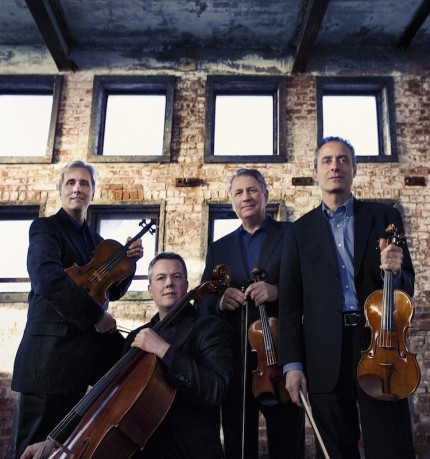Emerson Quartet marks 40th anniversary at the Harris Theater

Few chamber groups reach the four-decade mark with their founding lineup and technical proficiency largely intact.
Such an ensemble is the Emerson String Quartet, which is marking its 40th anniversary this season. The occasion proved an apt one for the opening concert of the Chamber Music Society of Lincoln Center series Wednesday night at the Harris Theater.
Three founding Emerson members remain –violinists Eugene Drucker and Philip Setzer and violist Lawrence Dutton. Cellist David Finckel departed the quartet in 2013 to concentrate on his role as co-artistic director (with pianist Wu Han) of the Chamber Music Society. Paul Watkins has followed Finckel, fitting fluently into the ensemble.
Wednesday’s program was a career retrospective of sorts, surveying a trio of composers whose music has been central to the Emerson’s long and successful career.
The evening led off with Beethoven’s Quartet in F minor, titled “Serioso” by the composer (how many Beethoven quartets are “unserioso”?). Op. 95 marks a way station for the composer on the way to his late quartets, where he would push genre and structural traditions to the breaking point. The F-minor Quartet is the shortest Beethoven would ever write and feels like a preparatory cleansing of the palette before that final period, with the composer stripping the genre down to its essentials before rebuilding it in a new form to accommodate a more personal and probing depth of expression.
If the aggressive hyper-intensity of the Emerson Quartet’s Beethoven in its early days–and complete recorded set—seemed at times to overwhelm the music, the years seem to have brought a more balanced, less frenetic approach. Indeed, the grazioso playing heard Wednesday seems more settled and Old World in flavor, a better fit with the music. The playing was still acutely focused, as with Watkins’ descending notes in the Allegretto, where all the players conveyed the sense of uneasy repose. The dedicated performance had admirable focus and commitment throughout with Setzer and colleagues drawing one in with the false quiet ending, only to make the sudden burst of fireworks that close the work have its full surprising impact.
Bela Bartok’s quartets were not the cornerstone repertoire they are now when the Emerson Quartet released its integral set in 1988. Indeed it was the critical acclaim of that recording that did much to put the ensemble on the map and launch their international career.
Along with its immediate predecessor, Bartok’s String Quartet No. 4 is among the most experimental and forward-looking work of his six quartets, cast in five movements with a myriad of challenges, not least the hard-snapped pizzicatos, dense textures, and moments that slip into near-atonality.
The group’s performance was fully sympathetic, the technical hurdles surmounted with aplomb. Yet compared to the Emerson’s hair-raising Bartok recordings and past performances, one could not help but feel the march of time in the moderated tempos, mild attacks and overall cautiousness. There was little of the music’s revolutionary fire, much less its manic ferocity. The central slow movement came off best, with Watkins exploring the unsettled nocturnal cello solo that frames the work.
The evening’s closer was Mendelssohn’s Octet, which formed a nice blending of the generations with the Emerson Quartet joined by their younger colleagues of the Calidore String Quartet, the latter making their Chicago debut.
Even now it’s astounding to think that Mendelssohn could write such a finished and perfectly crafted masterpiece as the string Octet at age 16. Eugene Drucker was a stylish if understated presence, underplaying the flashy brilliance of the first violin part in order to blend more cohesively with his seven colleagues. If the ensemble’s straight-faced Scherzo shorted the music’s leggierissimo charm, Drucker’s slender, silvery timbre conveyed the nostalgic sweetness of the Andante, and the effervescent finale was delightful, with all eight musicians throwing off Mendelssohn’s melodic bravura in most ingratiating fashion.
The Chamber Music Society of Lincoln Center performs Bach’s complete Brandenburg Concertos 7:30 p.m. December 19. harristheaterchicago.org
Posted in Uncategorized


